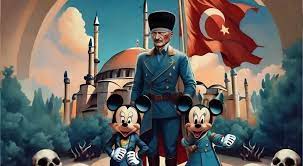ANKARA (AFP): Turkey has reacted angrily to Disney + deciding not to stream a series about the founder of the nation’s modern republic, promising an investigation into the matter.
A six-part show on Mustafa Kemal Ataturk had been set for release on the platform in time for the 100th anniversary of the October 29, 1923 founding of the republic.
But Disney + Turkey said Wednesday a version will be released on TV and in cinemas, a decision some in Turkey attributed to pushback over a painful and controversial chapter of the nation’s history.
Armenia says Ottoman Turk forces massacred and deported more than 1.5 million Armenians in the Ottoman Empire between 1915 and 1917, during World War I.
Around 30 countries have recognised the killings as genocide, a charge vehemently rejected by Turkey, which admits nonetheless that up to 500,000 Armenians were killed in fighting, massacres or by starvation during mass deportations from eastern Anatolia.
Ataturk was a commander in the military at the time and has faced blame over the tragedy.
Turkish media as well as a ruling party official claimed Disney was pushed to act on the streaming series by the Armenian diaspora in the United States.
“It is a shame that an American-based TV series/film platform bowed to the pressure of the Armenian lobby and removed the series ‘Ataturk’ from the air,” ruling AKP party spokesman Omer Celik wrote on Twitter.
Turkey’s media watchdog said it would launch an investigation into the claims of Armenian lobbying.
Walt Disney Turkey said that the series would be shown as a two-part movie on TV from October 29, and in cinemas from November 3.
The second part of the film is to arrive in movie theatres on December 22, it added.
“We are bringing our Ataturk content to our audience on the 100th anniversary of our Republic,” Cenk Soner, Disney’s general manager for Turkey, was quoted as saying in the statement.
Disney + Turkey attributed its decision to “changes made to our content strategy” and noted the cinema and TV releases would present the work to a “wider audience.”







